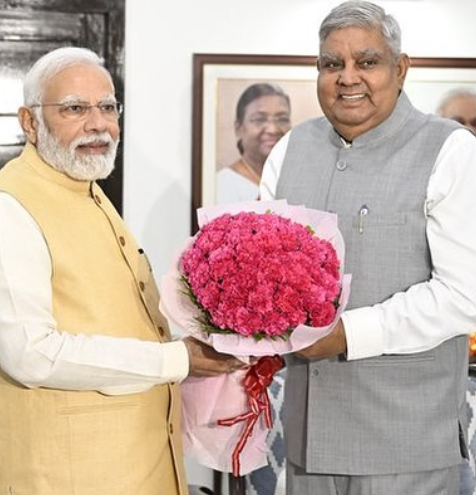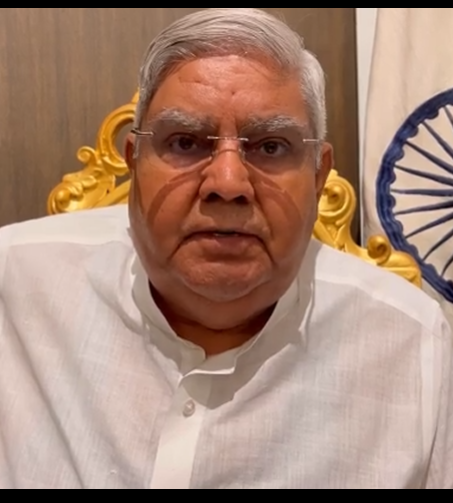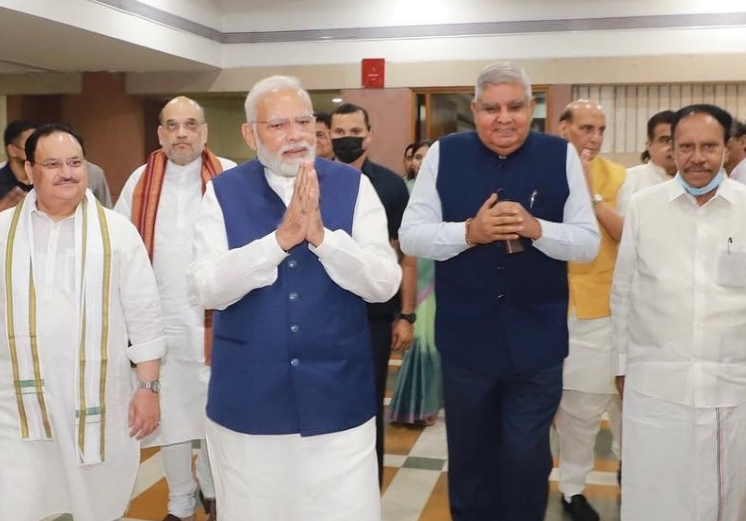On July 21, 2025, India witnessed a political earthquake. Vice President Jagdeep Dhankhar, Chairman of the Rajya Sabha since August 2022, tendered his resignation citing health concerns, effective immediately . This abrupt exit—just as Parliament’s monsoon session opened—has triggered a wave of speculation, outrage, and rapid decision-making within the ruling NDA and across political alignments.

Health Cited as Official Reason – But Is It the Whole Story?
In his resignation letter, Dhankhar mentioned “to prioritise health care and abide by medical advice” as his reason for stepping down . He had undergone a stent procedure in March and experienced a fainting spell in June . Supporters, including his brother-in-law, emphasized that political pressure played no part—underlining the sincerity of his health concerns .
Political Undercurrents & Legislative Tensions
But the timing and context surrounding his sudden move raise deeper questions. Insightful coverage from NDTV and LawChakra reveals that Dhankhar had accepted an opposition-sponsored motion to remove Justice Yashwant Varma over manipulated cash recovery—a move reportedly made without consulting the Centre .. This defiance, some reports say, angered the government, leading to heated exchanges and speculation that a no-confidence motion might have been in the works .
Sudden Exit, Immediate Vacuum
jagdeep Dhankhar’s abrupt departure came just hours after presiding over parliamentary sessions and scheduling official engagements—even announcing a visit to Jaipur the following day . His immediate resignation—without a formal farewell—left Parliament and his NDA colleagues reeling .
NDA in a Race to Fill the Post
The ruling alliance now has its work cut out. The NDA holds a solid majority—422 out of 786 electors across Lok Sabha and Rajya Sabha—making the next election relatively straightforward . Early names floated include Rajya Sabha Deputy Chairman Harivansh, seasoned governors, and senior Union ministers . The election timeline remains constitutionally open-ended, but officials say it will be “as soon as possible”

Also Read : Bryan Johnson’s Blueprint: The Anti‑Aging Startup on the Brink of Sale
Opposition Suspicion & Public Reaction
Not surprisingly, opposition parties have expressed deep skepticism. Descriptions like “a riddle wrapped in a mystery” from Congress MP Jairam Ramesh and calls for the Prime Minister to intervene highlight mistrust over the “health” narrative . Their stance: Dhankhar seemed active and alert moments before his resignation, making the leap to a health-related exit hard to swallow .
Constitutional & Governance Implications
This development spotlights critical constitutional features. While the Vice President’s resignation becomes effective upon presidential acceptance, the Deputy Chairman takes over Rajya Sabha proceedings, and an election to fill the vacancy must occur promptly . Though this preserves parliamentary continuity, it also highlights potential executive-legislative friction, especially when the VP exercises independent discretion in sensitive matters.

Key Questions Moving Forward
- Official narrative vs. suspicion: Will the government provide greater transparency behind Dhankhar’s exit?
- Election countdown: Who will NDA nominate? Will it be a consensus face or a hardliner?
- Parliamentary trust: Can Congress and other parties view the next Chair without reservations?
- Executive restraint: Will future Vice President feel freer to exercise constitutional authority?
- Precedent for resignations: jagdeep Dhankhar is the third VP to quit mid-term—does this set a new political template?
Conclusion
Jagdeep Dhankhar’s exit on July 21, 2025—mid-monsoon session, via an X-posted letter—has unfolded a complex drama of health issues, institutional autonomy, and political friction. As India gears up to elect a new Vice President, the episode also spotlights the tensions between constitutional duty and party loyalty. The coming weeks will reveal whether this was a health-triggered decision or a watershed moment redefining parliamentary governance.
This sudden development has not only left a leadership vacuum in the Rajya Sabha but also stirred national attention on the independence of constitutional offices. As political alliances react and strategize, the nation watches closely—eager to see whether this exit sparks reform, controversy, or both in India’s democratic journey.
